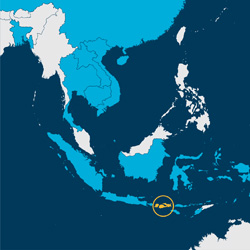Climate Adaptation Strategies for Rural Livelihoods in Nusa Tengarra Province, eastern Indonesia
2010–2014
 CSIRO is helping enhance the adaptive capacity of rural communities in Indonesia’s Nusa Tengarra Barat Province, one of the world’s least developed regions.
CSIRO is helping enhance the adaptive capacity of rural communities in Indonesia’s Nusa Tengarra Barat Province, one of the world’s least developed regions.
- The development challenge
- Our approach
- Project achievements
- Key lessons
- Project outputs
- Partners
- Publications
The development challenge
The islands of eastern Indonesia have some of the highest levels of poverty and food insecurity in the country. In 2009 Nusa Tenggara Barat had the second lowest Human Development Index among Indonesia’s 33 provinces, reflecting low levels of life expectancy, literacy rates, education and per capita income. Sixty-one per cent of rural sub-districts suffer chronic food insecurity, and the majority are in Lombok (World Food Program, 2010). Most people live in rural communities and derive their livelihoods from farming, fishing and small-scale local industries. They are highly vulnerable to changes in rainfall and weather patterns that could affect crop yields, livestock and fisheries. They are susceptible to natural disasters such as floods, drought and storms. These are becoming more frequent and intense as the global climate changes, exacerbated by population growth, fluctuating commodity prices and rising costs of living. Currently there is little information available to project the potential impacts of climate and other changes on rural communities, and no planning processes that can pro-actively anticipate them. Due to its regional importance, Indonesia is one of Australia’s largest partners in the aid program.
Our approach
This four-year collaborative project was led by CSIRO and the University of Mataram (UNRAM) and involved local and Australian partners. The project engaged provincial and local government, NGOs, businesses and communities to plan and test adaptation strategies that could enhance vulnerable communities’ incomes, while building the resilience of all stakeholders to long-term change and uncertainty. The project was intended to demonstrate an adaptation planning approach that could be scaled out in other rural regions of Indonesia.
Project achievements
A novel participatory planning method was developed by researchers from the UNRAM and CSIRO, the Indonesian agencies for Agricultural Technology Assessment Agency and Meteorology which integrated the data, tools and facilitation skills necessary for adaptation planning. The method was successively applied and refined by the team through five sub-district case studies.
‘No regrets’ adaptation strategies (i.e. strategies that deliver benefits even in the absence of climate change) were developed with vulnerable communities, based on their specific local needs. The research team, local farmers and fishermen tested 12 strategies in Lombok. Several have since been adopted, funded and scaled out by government agencies, the private sector and communities. These included:
- Alternative bondre seaweed production that is more resilient to storms than traditional methods. On average this strategy could increase household welfare by $500-600 AUD per year, which is greater than the provincial GDP per capita.
- Inter-cropping of maize, castor and mung beans to increase productivity and reduce the risk of crop loss from variable weather. On average this strategy could increase household welfare by $300-400 AUD per year, roughly equivalent to the provincial GDP per capita.
A Vulnerability Atlas of the Nusa Tenggara Barat (NTB) Province was produced by combining a livelihoods typology with projected impacts of climate change and population growth, and current adaptive capacity. The Vulnerability Atlas highlighted sub-districts where adaptation planning should be prioritised. The United Nations World Food Program has applied the atlas to guide their food security and resilience program, and has secured funding for the implementation of adaptation strategies. The atlas was also incorporated into the NTB Government’s Food and Nutrition Action Plan 2012, and the Strategy and Action Plan for Food Security and Climate Change.
Key lessons
- Climate change impacts vary widely across islands, requiring locally specific adaptation planning
- In many areas population growth and the loss of agricultural land will have a far greater impact than climate change
- Government, NGOs, science and community stakeholders have very different perspectives of livelihood problems and solutions. This requires multi-stakeholder planning processes to understand and integrate their views
- Most development programs are not yet prioritising ‘no regrets’ strategies identified by the project
- Although lengthy and resource intensive, multi-stakeholder planning greatly enhances participants’ adaptive capacity by catalysing innovation, new partnerships and empowering vulnerable communities
Project outputs
- ‘No regrets’ adaptation strategies based on specific local needs. EcoRegions Indonesia (ERI) has adopted the adaptation strategies in one sub-district where they are implementing a new eco-tourism development that promotes local food security. The strategies are also being adopted and scaled-out through new partnerships between UNRAM, district governments and KPDT, promoting greater adaptive capacity in the most vulnerable households and communities in NTB.
- The Vulnerability Atlas of the Nusa Tenggara Barat (NTB) Province, this will help the government of Indonesia and the World Food Program (WFP) to identify sub-districts where adaptation planning and action should be prioritised.
- UNRAM is now better equipped to carry out integrated and multi-disciplinary research. The research team has become recognised among their peers, change agents and communities as champions of adaptation and gender research. This has resulted in team members being employed by WFP’s Climate Change Adaptation Program in Jakarta and ERI, facilitating the linkages between the project and these change agents.
Project partners
UNRAM
- Indonesian Agricultural Technology Assessment Agency
- Indonesian Bureau of Meteorology and Geosciences
- NTB Government’s Climate Change Task Force
- NTB Planning Agency
- NTB Environmental Research Board
- NTB Food Security Agency
- United Nations World Food Program
- Indonesian Ministry of the Environment
- EcoRegions Indonesia
- Australian Department of Foreign Affairs and Trade (DFAT)
Publications
Special issue of Climate Risk Management, 2016
In this special issue, entitled ‘Climate Futures and Rural Livelihood Transformation in Eastern Indonesia’, we have written nine papers plus an editorial/synthesis, which describe the project’s approach, process, data, tools and evaluation. Each paper stands alone, but also links sequentially to other papers.
http://www.sciencedirect.com/science/journal/22120963/12
Research papers in the special edition
Scenario planning to leap-frog the Sustainable Development Goals: An adaptation pathways approach.
Evaluating economic costs and benefits of climate resilient livelihood strategies.
Evaluation of project – ![]() 2-page fact sheet
2-page fact sheet
Evaluation of project – ![]() 8-page brochure
8-page brochure
Kecamatan Janapria Case Study Scenario Planning Workshop Report, 25-26 January 2012, Gran Legi Hotel, Mataram, Lombok
Climate adaptation in Indonesia: exploring global and local narratives through a visual approach, conference abstract
NTB Scenario Planning Workshop Report, 31st May – 2nd June 2011: Climate Futures and Rural Livelihood Adaptation Strategies in Nusa Tenggara Barat Province, Indonesia
Livelihood futures – adaptation options for Indonesian communities, blog article, 2013


